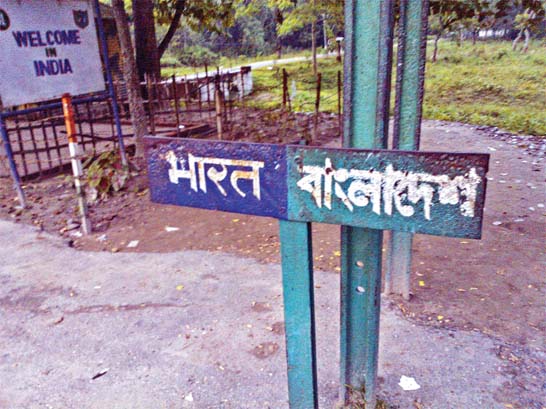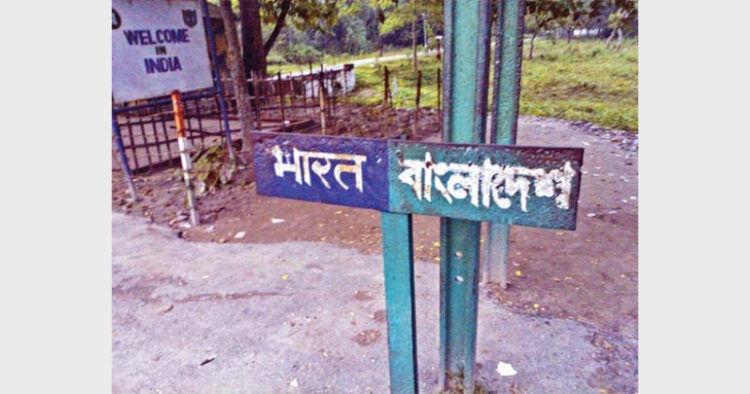 The new Chief Minister of Assam Sarbananda Sonowal looks determined to put an end to illegal crossings along Assam-Bangladesh border. Handling the high hopes in a bordering state like Assam would be trickier, for which there is a need for clear strategy addressing complex dynamics
The new Chief Minister of Assam Sarbananda Sonowal looks determined to put an end to illegal crossings along Assam-Bangladesh border. Handling the high hopes in a bordering state like Assam would be trickier, for which there is a need for clear strategy addressing complex dynamics
Prashant Kumar Sharma
The victory of BJP in Assam has aroused a new hope among the denizens of the State. They feel that this government under the leadership of Sarbananda Sonowal would firmly withstand all the promises made during the election and put an end to the issues of illegal crossings, which seem to be exacerbating owing to the disasters caused by climate change.
The issues of illegal crossings into the Bharatiya border from Bangladesh have been the much debated and heated subject of political discourse. Illegal migration from Bangladeshi side has been rampant that has gone unaccounted to the large extent. Every political party is found to be playing its vote bank card on this grave concern. Thus, politics of blame game and we can say, the politics of accusation and recrimination begins among political parties. As far as the case of illegal crossings into Assam is concerned, a Memorandum of Settlement was signed between the Central government and leaders of the Assam Movement on August 15, 1985, that is also known as ‘Assam Accord’ aimed at identification and expulsion of illegal immigrants from the State.
Nevertheless, the matter pertaining to the illegal crossings continued unabated over time that has not been paid proper attention by the previous government in Assam to resolve the prevailing crisis. In the recently concluded Assam Assembly elections, constituents voted BJP to power. Repelling the illegal Bangladeshis out of the Bharatiya states is among the top priority. Sarbananda Sonowal has promised that implementation of the ‘Assam Accord’ would be his top administrative agenda. BJP had flaunted the issues of ‘illegal immigration’ during this election campaign. It was promised that, ‘If BJP is voted to power, the greater Assamese identity would be endeavoured to restore.’
Bharat and Bangladesh are two distinct sovereign and independent countries where both strive to safeguard their individual national interest and national security. Each country ensures the safety of its people and territorial boundary from any sort of aggression. The illegal migration from Bangladesh has on high political agenda in some of the North-East states of Bharat. This is mainly because this has generated host of destabilising social, political, ethnic and communal tensions and violence within the Bharatiya states. For instance, the sporadic conflict in Assam between the illegal immigrants of Bangladesh and ethnic communities within the State has been widely recorded.
Bharat began to fence its international border with Bangladesh in mid 1980s. The fencing of the border (started in 1986) till date has completed 2,677.81 km. Both governments of Bharat and Bangladesh have regarded a 150 yards on both sides of the border as “no man’s-land”. This is because many of the houses have a front door in one country and a back door in the other. As some citizens privatively own the entire area on the border side, acquiring the land for fencing purpose is a tricky issue for both the countries. Moreover, the fencing of the border has also generated some serious problem within the Bharatiya side. The fencing issue becomes more important now against backdrop of climate change triggered likely displacement of many millions of Bangladeshis. Fencing may prevent the intrusion into the Bharatiya border. However, it is also likely to be widely resented on the Bangladeshi side. An environmental commentator based in London, Isabel Hilton, argued, “Bangladesh is such kind of a country that could generate more climate refugees than anywhere else on the earth.”
A Member of Parliament, Sirajuddin Ajamal, exhorted the government to build a concrete wall around the Bangladesh. Because of the influx of Bangladeshi migrants, the Bharatiya Muslims of Assam had suffered a lot over the years as they had been tagged as Bangladeshis.
It is stated that in 2001, the Union Home Minister said that over 12 million illegal Bangladeshi immigrants are residing in 17 states of Bharat. Nevertheless, this statement was turned down by Ministry of Home affairs as baseless and hearsay. However, another reference showed that number of illegal immigrants of Bangladesh in Bharat was 1.2 crore as on December 31, 2001.
Prakash Jaiswal, Minister of State for Home Affairs, in 2004, reported to the Rajya Sabha that the number of illegal Bangladeshis was 1, 20, 53, 950 in Bharat. In a statement, former Home Minister of Bharat, L K Advani mentioned that 20 million of illegal immigrants from Bangladesh needed to be sent back. Bharat asserted that migrants cannot have right to stay permanently in Bharat, whereas Bangladesh alleged Bharat of driving out its own Bengali speaking Muslim citizens on the pretention of Bangladeshi migrants. In 2003, the Foreign Minister of Bangladesh was quoted as saying that “not a single unauthorised Bangladeshi resided in India.”
The Supreme Court of Bharat had slammed the Central government and former Chief Minister of Assam Tarun Gogoi for making delay in fencing of the eastern border. The apex court accused both the governments for “dragging its feet” on fortifying the eastern ‘porous’ border with Bangladesh despite its judgment last year that security chinks are posing serious threat to the lives of the ordinary people. The bench led by RanjanGogoi has appointed a court commissioner to unearth the ground realities of happenings on the border to report the court. The court has appointed the senior lawyer Upamanyu Hazarika as a court commissioner to visit the border.
Fencing of the border is the top priority of the Sonowal’s government in Assam. Even earlier, Sonowal had approached to the Supreme Court to quash the Illegal Migrants (Determination by tribunals) Act in 2005 that led to the court scrapping this highly controversial law. Sonowal has stated, “We will work towards finishing the border sealing work within two years, and it includes the riverine border.”
The road ahead would be trickier for Sonowal because it is not only the question of fencing the border and expelling the illegal immigrants. Many other aspects are intertwined with the issue. How Bangladesh reacts and cooperates on these issues of bilateral concern would be of vital significance. What if identified illegal entrants refused to be accepted by Bangladesh as it always has been the case. These concerns will be certainly high on agenda for Sonowal government who has got support from the Centre and from the people of Assam.
(The writer is Research Scholar at Center for South Asian Studies, SIS, Jawaharlal Nehru University,
New Delhi)














Comments